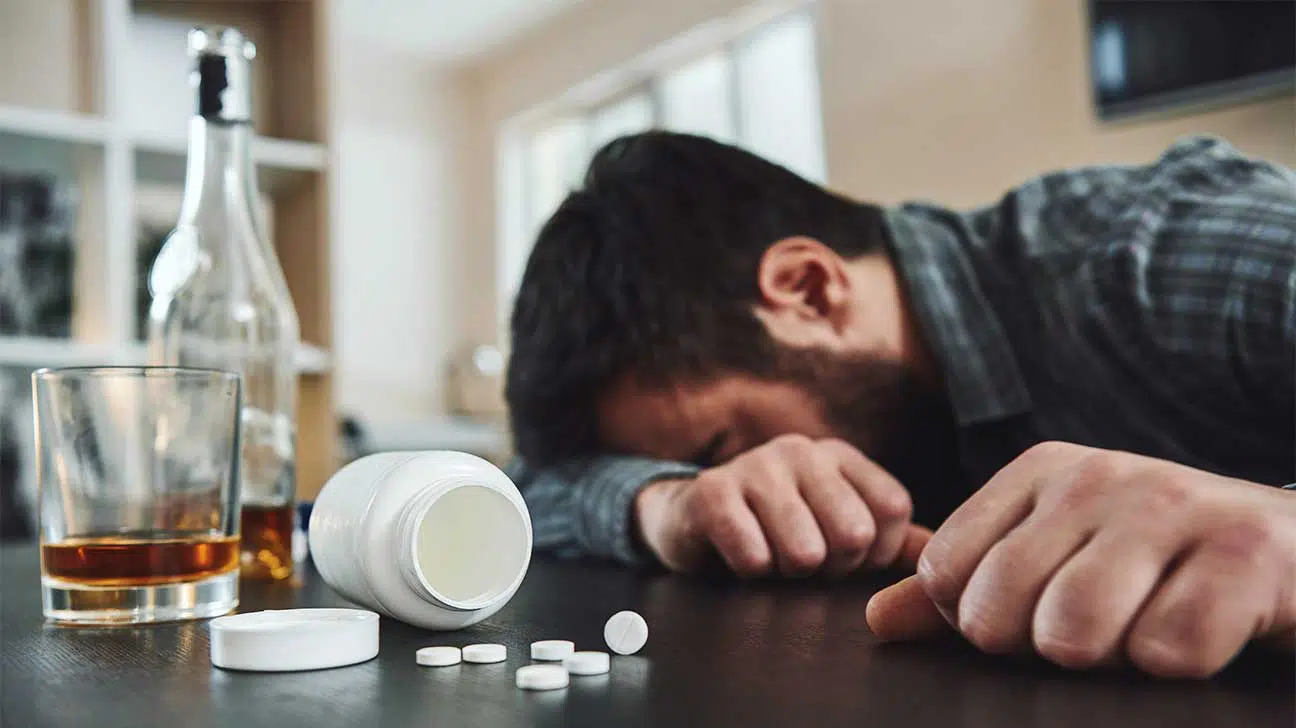
Alcohol is a depressant that can have a range of physical and cognitive effects, including lowered inhibition, slurred speech, a feeling of warmth, and foggy thinking.
Mixing alcohol with stimulant drugs can mask the effects of alcohol. When misused, combining these substances can lead to unpredictable, and potentially dangerous, outcomes.
Find out more about the dangers of mixing stimulants and depressants
What Happens When You Mix Alcohol With Stimulants?
Stimulants are a category of substances that stimulate central nervous system activity. This has the opposite effect of alcohol, which generally slows down CNS activity.
Taken together, this may cause:
- dizziness
- nausea
- vomiting
- cognitive impairment
- slurred speech
- blurred vision
- impaired coordination
- poor balance
- severe intoxication
Combining alcohol with stimulant drugs, including caffeine, can be dangerous. This sends conflicting messages throughout the body, which can disrupt basic life functions.
Stimulants may cause a person to experience the intoxicating effects of alcohol faster and can make a person less likely to identify when they are intoxicated.
Mixing Alcohol And Methamphetamine
Methamphetamine, or meth, is a highly addictive stimulant. Drinking alcohol while taking meth can be very dangerous. This may lead to heart problems, seizures, and accidental overdose.
Find Out More About Mixing Alcohol and Meth
Mixing Alcohol And Vyvanse
Vyvanse is a prescription stimulant used to treat ADHD and binge eating disorder.
Mixing Vyvanse with alcohol may cause:
- increased blood pressure
- heart problems
- higher risk of alcohol poisoning
- enhanced side effects
If you or a loved one is taking Vyvanse for a medical condition, talk to your doctor about the safety of drinking alcohol while taking this medication.
Drinking excessive amounts of alcohol while taking Vyvanse may be a sign of alcohol dependence or alcohol use disorder.
Find Out More About Mixing Alcohol and Vyvanse
Mixing Alcohol And Cocaine
Cocaine is an illicit drug that can have powerful stimulant effects, including a rush of euphoria when injected, snorted, or smoked.
Mixing alcohol with cocaine can be dangerous. The use of both alcohol and cocaine can cause the formation of a substance known as cocaethylene in the body, which can enhance the toxic effects of these drugs.
Find Out More About Mixing Alcohol and Cocaine
Mixing Alcohol And MDMA
Ecstasy, or MDMA, is a psychoactive drug with hallucinogenic and stimulant effects. It is generally used for recreational purposes in club or party settings.
Drinking alcohol while taking MDMA can increase the risk of becoming dehydrated, experiencing irregular heartbeat, and alcohol poisoning.
Find Out More About Mixing Alcohol And MDMA
Risks Of Mixing Alcohol And Stimulants
Alcohol can conceal the effects of stimulants and vice versa, due to their counteracting effects within the body. Unfortunately, this poses a number of serious behavioral and health risks.
Mixing alcohol with stimulants may increase the risk of:
- developing a substance use disorder
- getting into a major accident
- experiencing thoughts of suicide
- worsened mental health issues
- aggressive or violent behavior
- alcohol poisoning
- severe cognitive impairment
- severe dehydration
Mixing these substances doesn’t just cancel out one or the other’s effects. This sends conflicting messages within the body that can upset the functions of the body’s vital organs.
Dangers Of Mixing Alcohol And Stimulants
Drinking alcohol while misusing stimulant drugs can pose serious and potentially life-threatening dangers.
Primary dangers of mixing alcohol with stimulants include:
- alcohol poisoning
- drug overdose
- heart attack
- cardiac arrest
- stroke
- coma
- sudden death
Chronic use of these drugs can also have long-lasting effects on some of the body’s vital organs, including the kidneys, lungs, liver, and heart.
Signs Of Overdose After Mixing Alcohol With Stimulants
Mixing alcohol with stimulants can be lethal. People who mix these drugs may not be aware of how much they’ve had to drink, in part because stimulants can mask alcohol’s effects.
Signs of an overdose or alcohol poisoning include:
- difficulty breathing
- shortness of breath
- slurred speech
- mental confusion
- vomiting
- irregular heartbeat
- seizures
- unconsciousness
If someone has collapsed, stopped breathing, or is unresponsive after mixing alcohol with other drugs, call 911 for emergency medical attention.
Find Treatment For Drug And Alcohol Abuse
Alcohol abuse commonly co-occurs with other forms of substance abuse. With treatment, overcoming polysubstance abuse is possible.
By calling our helpline, we can:
- identify suitable treatment options
- explain the different addiction treatment options
- verify your insurance
- find the best treatment program to meet your needs
If you or a loved one is drinking heavily in combination with other drugs, call our helpline today for more information about available treatment options near you.
Addiction Resource aims to provide only the most current, accurate information in regards to addiction and addiction treatment, which means we only reference the most credible sources available.
These include peer-reviewed journals, government entities and academic institutions, and leaders in addiction healthcare and advocacy. Learn more about how we safeguard our content by viewing our editorial policy.
- American Psychological Association (APA)—Cocaethylene formation following ethanol and cocaine administration by different routes
https://www.researchgate.net/publication/50998425_Cocaethylene_Formation_Following_Ethanol_and_Cocaine_Administration_by_Different_Routes - U.S. National Institute on Drug Abuse—Misuse of Prescription Drugs Research Report
https://www.drugabuse.gov/download/37630/misuse-prescription-drugs-research-report.pdf?v=add4ee202a1d1f88f8e1fdd2bb83a5ef - U.S. National Library of Medicine—Acute and residual interactive effects of repeated administrations of oral methamphetamine and alcohol in humans
https://www.ncbi.nlm.nih.gov/pmc/articles/PMC3220757/ - U.S. National Library of Medicine—An Epidemiological Analysis of Co-Occurring Alcohol and Drug Use and Disorders
https://www.ncbi.nlm.nih.gov/pmc/articles/PMC3860461/ - U.S. National Library of Medicine: MedlinePlus—Lisdexamfetamine
https://medlineplus.gov/druginfo/meds/a607047.html


